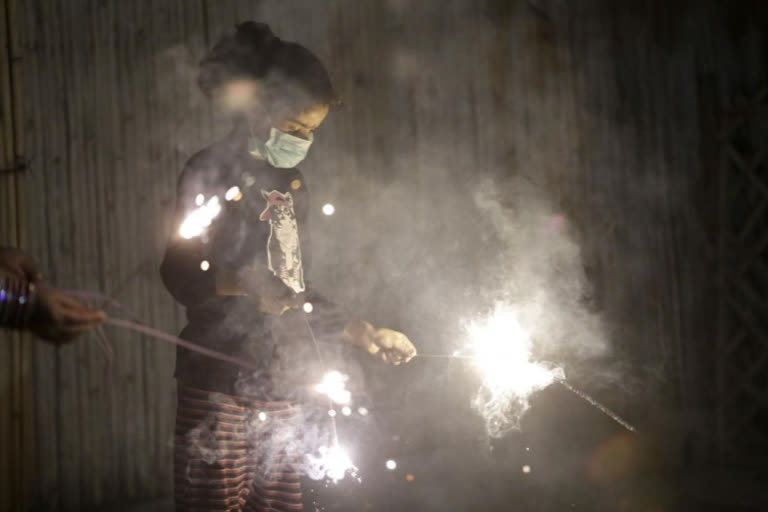Hyderabad: The festival of Diwali arrives in a few days and in some parts of the country the cold weather due to the winter season has also started to tighten its grip. The change in weather is harmful to people who suffer from respiratory diseases or allergies and on the other hand, the pollution caused by firecrackers on Diwali adds to the difficulties of people suffering from asthma or related allergies. People who have suffered a severe infection of COVID and are currently facing problems due to it are more prone to danger during this period.
People forced to live in the shadow of COVID for the last two and a half years have celebrated almost all the festivals this year with double the enthusiasm and everyone considers the case to be the same for Diwali. The festival of Diwali brings happiness and prosperity but also takes a heavy toll on the health of some people. During winter, patients with respiratory diseases or people susceptible to seasonal infections are more likely to fall ill or develop health problems. In such a situation, the increasing pollution due to firecrackers on the occasion of Diwali increases this problem even more.
The problem in question is that a large part of the population has not fully recovered from the physical problems faced during COVID and is still going through the recovery phase. In such a situation, ignoring the cold, pollution, festive food and health should not take a toll on people's health, so people who will be facing such conditions along with asthma and other respiratory diseases also need to take special care of themselves.
Delhi's General Physician Dr Alok Kumar says that pollution has increased a lot in the country and due to firecrackers on Diwali, it increases even more. Allergic tendencies are found in patients with asthma or respiratory diseases and can be triggered by some diet, weather, environment or anything else. In such situations, when the particles of pollution reach inside the body along with your breath, they trigger allergies and increase the congestion and mucus in the lungs. Due to this, breathing problems, shortness of breath, cough and phlegm start increasing in the patient. As the problem progresses, the patient may have to be admitted to the hospital. Such attacks can be dangerous, risking the patient's life.
Apart from asthma, the problems of people suffering from lung fibrosis, allergic rhinitis and bronchitis diseases also increase around Diwali. At the same time, after the festival, the effects of weather and imbalance in food can also cause sore throat or an upset stomach and cold, fever and some skin-related problems in people.
He explains that for many people who had suffered more damage and other problems in the lungs due to Corona infection and are currently in the recovery phase facing many related problems, cold and firecracker pollution will be more harmful to them. The lungs of many people are still not completely healthy to face these conditions. Complications can also arise for people who are suffering from diabetes, blood pressure or heart disease. People facing the post-COVID stage need to take more care of themselves along with patients with asthma or other respiratory diseases.
Also read: Covid pandemic caused prolonged decline in global life expectancy: Study
Dr Alok explains that although people who are suffering from the serious nature of such problems live in such places where there is a lot of pollution, for some time they go to a place where the effect of pollution is less and the air is relatively clean. As it is not possible for everyone, people need to take special precautions before and during the festival such as:
- Take the medicines prescribed by the doctor regularly and on time. Asthma patients should always keep their inhalers with them and avoid contact with things and food items that can their allergies.
- Take care of your diet. Avoid excessive fried, spicy, pungent, sweet, processed foods and sweets prepared with artificial colours. Apart from this, avoid consuming cold drinks or other cold beverages, or cold food kept in the fridge. At the same time, consider drinking lukewarm water for a while and consumption of hot beverages, but within limits. Eat hot and fresh food.
- Avoid going out of the house as much as possible, but if necessary, then leave only after covering your mouth and nose with a mask. Wearing a cloth or a normal mask under normal circumstances can reduce the entry of pollution particles into the body to some extent. It is more advisable for sensitive or allergic people to wear an N95 mask while going out.
- Taking steam and gargling with hot water can also be of great benefit. In fact, in asthma and many lung and breathing problems, the mucus starts thickening and can cause problems. Hot water steam helps in loosening and clearing the mucus. Apart from the steam, the chest and back are also relieved when compressed using a hot water bag.
- Special care should be taken of hygiene and cleanliness and keep washing hands after regular intervals. But people suffering from allergies, asthma or breathing problems should avoid cleaning the house on their own, especially in places with dust. It can trigger an attack.
Dr Alok says that despite all the precautions, if there is excessive breathlessness and persistent cough, difficulty in breathing, heaviness in the chest, as well as watery eyes and nose, then definitely consult a doctor. On the other hand, if a person is having an asthma attack, then keep the following instructions in mind:
- Ask them to sit up straight and calm down. Ask them to take long and deep breaths slowly. By sitting upright, the windpipe opens.
- Use an inhaler and take up to 10 puffs every 30 to 60 seconds. If there is no relief even after this, then without wasting time contact a doctor and take the patient to a nearby hospital.



